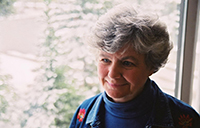A timely issue was the focus of the McLaughlin College Public Policy Lecture on Nov. 18, with guest speaker Mary Jo Leddy delivering a talk titled “Crossing the Ocean of Indifference: Canada’s Response to the Refugee Crisis.”

Leddy, a professor with Regis College at the University of Toronto, is the founder of Romero House – a community home for refugees. She is also the founding editor of the New Catholic Times and is a celebrated journalist, author, peace activist, refugee advocate, theologian and university lecturer.
The relevant nature of her lecture was highlighted by Professor David Leyton-Brown, a master of McLaughlin College, who remarked on the current refugee situation in Canada and across the globe.
The event opened with a welcome from Diane Woody, associate dean of teaching and learning in the Faculty of Liberal Arts & Professional Studies (LA&PS), who noted the Faculty is part of a broader effort at York University to sponsor Syrian refugee families to come to Canada. Woody also spoke on behalf of Dean Ananya Mukherjee-Reed, who sent her regrets for not being able to attend the lecture.
James Simeon, professor and director of the School of Public Policy & Administration (SPPA), introduced Leddy and said it was a rare occasion for the lecture to align with a public policy concern of the day – the world’s refugee crisis and Canada’s response to this humanitarian emergency.
He introduced Leddy as an exceptionally well-educated individual who had worked under the supervision of Emil Fackenheim, a world expert in the Holocaust, during her graduate studies in philosophy.
Leddy is an award-winning author of numerous books and is a highly regarded human rights and peace activist who has earned awards including the Canadian Council of Christians & Jews Human Relations Award, the Gunther Plaut Humanitarian Award, the Ontario Citizenship Award and the Order of Canada. She also holds six honorary doctorate degrees, including one from York University.
During her lecture, Leddy spoke about how the photograph of a dead young child, Alyn Kurdi, washed ashore on a Turkish beach, ignited the passion of people around the world in the belief that we can and must do something in the midst of the worst refugee crisis of the 21st century.
The photograph became a pillar during the federal election campaign, forcing the nation’s leaders to address the global refugee crisis and sparking the new Canadian government’s commitment to bringing 25,000 Syrian refugees to Canada by early 2016.

The Nov. 13 terrorist attacks in Paris have also entered the debate about the number of Syrian refugees that should be brought to Canada. Leddy remarked on how the public image of refugees went from “angels to demons” in such a short period of time after the terrorist attacks.
If we see ourselves as a generous, decent and tolerant society then how is it that our image of refugees can swing so quickly?, she asked, and suggested opinions about refugees should come from meeting and knowing “real refugees.”
Leddy emphasized the importance of knowing “real people” as opposed to knowing only public policies or issues, and suggested we ask, ‘How do public policies affect real people?’
Leddy discussed the issue of security, and shared that she has attended interviews where refugees have been questioned by the Canadian Security Intelligence Service (CSIS) and Canada Border Services Agency (CBSA). Many of the officials in these agencies do not speak the refugees’ languages or know any of the pertinent details about the countries where the refugees come from. She indicated that she did not find these security and intelligence agencies to be competent, and said this is an area that needs great improvement.
She shared a story about her experience during a refugee’s security interview, recalling that the government official claimed the refugee had no rights. Leddy challenged that statement, only to be told by the official that in the interview, the officials determine what rights the refugee has. This, said Leddy, is unacceptable conduct, but it is characteristic of the wider problem.
Leddy stressed the importance of considering how we see our country. We do not own this country, she said, but rather we share it with others. There needs to be more focus, she said, on what we want to be as a people.
During the Q&A segment of the program, Barbara Hall, Osgoode Hall Law School alumna, former chairperson of the Ontario Human Rights Commission and former mayor of the City of Toronto, stated that during the last federal election a number of former refugees were elected to the House of Commons. This augurs well, she remarked, for future refugee policy in Canada.
Leddy concluded her lecture by stating that Canada has the moral obligation to assist refugees, especially during this humanitarian crisis, and the capability to welcome thousands of them. She called on all Canadians to select the “just” and the “good” path that will provide the best future for everyone.
The lecture was co-sponsored by the Office of the Master, McLaughlin College, the School of Public Policy & Administration (SPPA) and the Master of Public Policy & Law (MPPAL).


